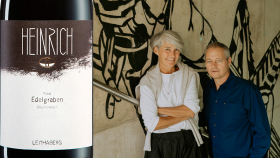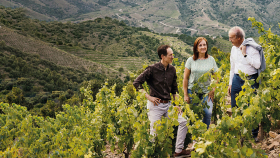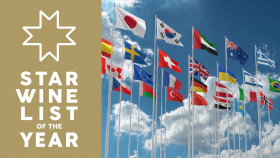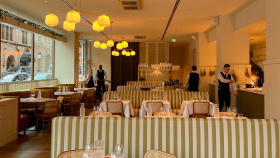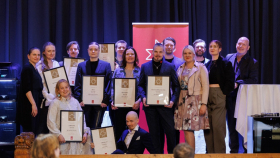Marc Almert: ”The key is to know what you're studying for”

Use a mix of studying tools, be thorough – and don't forget to take a break once in a while. Here are reigning Sommelier World Champion Marc Almert's best advice when it comes to learning wine!
Your best general advice when it comes to learning about wine?
”The key is to know what you are studying for; trying to advance your personal wine knowledge (either for leisure or for a certain work environment), a competition, a formal exam or a mix of the above. Know your deadlines, and if it is a competition or exam try to get a hold on the syllabus, former questions / videos and try to speak to people that have done the same thing. Try to analyse what the required mind-set and the way the questions / tasks are set or phrased is.
If there is a certain date when the exam or competition is held; make yourself a schedule, outlining when and what you want to study – and leave gaps for breaks, unplanned overtime at work and of course repetition. Remember to allocate more time to those topics you do not know well and or do not deal with every day.
Look into yourself and read about study techniques; are you more the visual, more the text or more the electronic girl or guy? Adapt your study techniques accordingly.
Three of the most valuable tips I ever got;
• It is a marathon, not a sprint.
• When you come home from service, write down which wines you sold that night. And then look into those regions, grapes, producers, vintages etc. in more depth. That way you will get to know your wine list even better and at the same time revise certain aspects of theory.
• Don’t forget the non-Wine topics, for example, sake, beer, coffee, tea, spirits, cocktails, cigars, cheese...”
Tell us about your studying routine!
”As mentioned above, this is very dependent on what you are studying for and what kind of personality you are. For example, I can’t concentrate early in the morning, but don’t mind at all to stay up late at night after service. Depending on your schedule, I recommend studying at least a little bit every day (for example during your first coffee, or between lunch and dinner service) rather than only once a week a bit chunk.
Within one week leading up to a competition or exam, I try to do a mix of the following:
• Flashcards / theory revision as often as possible, at least twice a day
• Read some current media (websites or magazines)
• Listen to a podcast or watch a video
• Do at least two tasting flights (with colleagues) of wines and at least one other (spirits or beer)
• Do one tasting for myself (like Shiraz from different regions, left bank vs right bank Bordeaux, or another themed topic)
• Do two service dry runs (when preparing for a practical exam or competition) with colleagues
• Do at least two Skype sessions with other colleagues, where we ask each other on theory
• Do one written exam / set of questions under time pressure”

How do you get the knowledge to stick in your head, rather than forgetting after just a short while?
”Mix the media. Do not ONLY do flashcards or ONLY do old exam papers. If you can, mix websites, articles, books, texts, lists, flashcards, videos, podcasts, etcetera.
Try to tackle a topic from different angles: for example, I struggle with memorising Super Tuscans (grapes, producers, inaugural vintages, etc.). Partially because it is a very long list. So I broke it down into smaller pieces:
• The first ten
• All Sangiovese based
• All Merlot based
• All that changed their grapes during the course of time
• The most expensive
• Etc.
That way you have the same wine on several smaller lists or flashcards, which will aid your memory. A similar approach with the 1855 Bordeaux classification: all St. Julien (all classification levels) vs. all 2nd Growths (of all communes), etc.
It is important to cross-reference; let’s say you're learning a list of subregions or Grand Crus. Build the same material into several different questions and orders:
- Flashcard: From Largest to Smallest
- Flashcard: From North to South or West to East respectively
- Flashcard: Oldest to Newest
- Flashcard (where applicable): Best to Worst
Repeat! Go back to topics you studied regularly, to make it stick. Apps can help you with this (see below).
Be thorough! Especially for competitions, you will be asked a lot of very detailed questions on products you probably will not have seen often. For example, leading up to the world cup I made myself lists of spirits, beers, waters, grape crossings, grape synonyms, teas, wine producers & regions in “unusual” countries, UNESCO world heritage sites related to wine, wine personalities, winemakers, journalists, monopoles of Burgundy, labels of Mouton Rothschild, pruning methods, rum & whisk(e)y distilleries, former champions, etcetera.
Stay current! Read blogs, websites, magazines and make notes on which producers were sold, who took over certain positions (i.e. chef de cave) or which new wine (law, region, cuvée) was launched or created.
Mix the languages! I used to study all of Australia, then New Zealand, then the US, etc. I ended up mixing up all subregions and producers. Now I try to do one part of Australia, then i.e. something from Spain, then France, then Eastern Europe, and then back to Australia. That way it stays more separate in my mind.
And, don’t forget to take a break! It is crucial to sleep well, stay fit, spent time with your loved ones, and get your mind on other topics regularly too.”

Theory or practice – where do you start?
”At the moment, definitely theory. However. in general, I believe it is important to do a mix of tasting, practical and theory. Whilst theory is the easiest to do on your own, if possible, you should try to meet up with colleagues for a tasting and practical dry-run at least twice a week, especially in the time leading up to a competition or exam.
Never forget, that what you do in a practical exam reflects your practical every-day work; for example: get in the habit of ALWAYS wiping the bottleneck, then you will do it automatically in your next exam or competition.”
Do you use any special tools? Like apps, maps, flashcards etcetera?
”Maps are all over my flat – it requires some convincing of your roommates or spouse, but makes for a colourful wall decoration, haha. In terms of websites, to me, GuildSomm has been a very valuable tool with several databases, study guides, articles, quizzes and maps. The 100 USD per annum are definitely a worthwhile investment. Furthermore, many regions and producer associations have great and informative websites.
When I am tired (or travelling) I also like to listen to Podcasts, notably GuildSomm and Levi Dalton’s “I'll Drink to that”. I am also quite an old fashioned guy and have got several study books and magazines (Decanter, World of Fine Wine, etc.) at home. The European Court of Master Sommeliers website has a good recommended reading list.
Speaking of flashcards: I used to work with StudyBlue but have recently transitioned to Anki. Here I love the spaced repetition, which makes sure the material sticks. Those that I can still not remember I then convert to physical (paper) flashcards and use them more and more.
A word of caution: when working with electronic flashcard apps or websites there often is the function of sharing decks. I believe creating your own decks – and thus also doing thorough fact checks – is more efficient and makes the theory stick easier.”
Master Sommelier Shayne Bjornholm’s Twelve Areas of Study for a Wine Region
1. Geography and Climate (country, area of country, major natural features such as mountains, lakes, rivers, forests, where it is in relation to other regions, etc)
2. Grapes Allowed (all of them, not just the obvious ones)
3. Viticultural Techniques (ripeness levels at harvest, vine training, harvest dates, irrigation allowances, etc.)
4. Vinification Techniques (fermentation, percentages of blends, acidification/must enrichment, etc.)
5. Aging Laws (Oak/No Oak, Length of time in Wood and Bottle, release dates)
6. Soils
7. Official Regional Classification (Vin de Table vs. AOP, State vs. Region in Australia, etc.)
8. Sub-Regional Classifications (vineyards, villages, producers)
9. Major Producers (at least 5 for each region and what makes them unique, particularly signature cuvées) and some Historical Lore (the big stories, the romance)
10. Vintage Knowledge (Poor/Fair/Good/Excellent and Why)
11. Proper Terminology for Laws (Gran Reserva vs. Crianza in Rioja)
12. Specific Terminology related to that Region (Sforzato, Aszu Essencia vs. Essencia, Hanepoot)
Do like the Pros - search 2500+ wine lists





